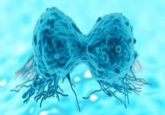Unsupervised analyses reveal molecular subtypes associated to prognosis and response to therapy in colorectal cancer

Colorectal cancer (CRC) tumors are highly heterogeneous at a molecular level. Recent studies have proposed molecular classifications of intrinsic CRC molecular subtypes identified after applying unsupervised clustering methods to genome-wide data. Those subtypes, characterized by their distinct clinical and biological features, provide new insight about the complexity of CRC. A common finding shared by almost all analyses was the identification of microsatellite instable tumors as an independent cluster, which is associated to better prognosis. Clusters of tumors characterized by a high stromal component exhibited a poor outcome. Moreover, some of the clusters were associated with response to standard chemotherapy or targeted agents. Regarding biological functions underlying tumor subtypes, recurrent ones across different studies were WNT pathway activation, epithelial-to-mesenchymal transition or cancer stem cell-like phenotype. Now, the challenge is to translate these findings into a comprehensive CRC classification and characterization helpful for patients’ stratification and better clinical management.
Click here to view full article.



